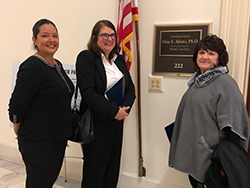NASFAA Members Talk FAFSA Simplification, Verification, and Perkins on Capitol Hill
By Joelle Fredman, NASFAA Staff Reporter
NASFAA members from North Carolina, Arizona, and Colorado institutions met with congressional staff members on Capitol Hill Thursday to express their support for a new bill to simplify the FAFSA and fix verification issues, as well as discuss the importance of providing institutions with more tools to assist students in borrowing.
The members—Debbie Brooks from Central Piedmont Community College, Karen Emmer from Cochise College, and Sylvia Martinez from Colorado State University—met with staffers from several congressional offices on both sides of the aisle, including those tasked with drafting bills to reauthorize the Higher Education Act (HEA).
During their meetings, the members told policymakers that they supported a bill introduced last week that would, through better integration with the Department of Education (ED) and the Internal Revenue Service (IRS), simplify the application, verification, and student loan repayment processes. The bill, the Faster Access to Federal Student Aid (FAFSA) Act of 2018, would allow the IRS to disclose tax return information to authorized ED officials for the purposes of “determining eligibility for, and amount of, federal student financial aid.” The bill implements a portion of NASFAA’s FAFSA simplification proposal, which was presented by NASFAA President Justin Draeger in a Senate Health, Education, Labor, and Pensions (HELP) committee hearing last year. Martinez added that members also emphasized the need for “updates and consistency” with regards to the IRS Data-Retrieval Tool (DRT).
Additionally, the members discussed the impact that the loss of the Perkins Loan program has had on students, as well as the importance of helping institutions be more proactive when it comes to student borrowing, such as by giving schools the authority to limit loan amounts for certain groups of students and the ability to mandate additional loan counseling.
The members said that participating in the Advocacy Pipeline was a great learning opportunity.
“We, financial staff, see how issues affect students and families,” Martinez said. “This is our opportunity to share these stories with those that can make change.”
Brooks added that “no one can better convey the information than a financial aid representative from [a lawmaker’s] district or state,” and that “financial aid representatives can help members of Congress and their staff identify and understand financial aid issues and their effects that are important to their constituents.”
For more pictures from the event, check out NASFAA's Advocacy Pipeline Facebook album. If you're interested in volunteering to be a part of NASFAA's Advocacy Pipeline, fill out an interest form here.
Publication Date: 11/20/2018





You must be logged in to comment on this page.